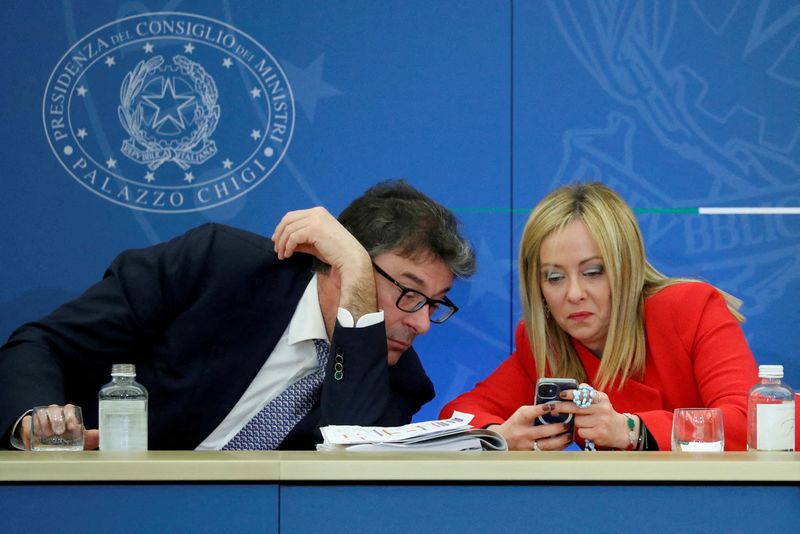Analysis-Asset sales are no panacea for Italy’s debt malady
2024.06.05 01:29
By Angelo Amante and Giuseppe Fonte
ROME (Reuters) – Italy’s plan to raise around 20 billion euros ($22 billion) over three years by selling state assets to rein in debt is almost certain to fall short of its targets due to persistent political and regulatory hurdles, analysts and officials say.
Prime Minister Giorgia Meloni’s government announced last September the initiative as part of attempts to manage a public debt seen hovering around 140% of gross domestic product in 2026. The assets earmarked for sale include stakes in postal service Poste Italiane and railway group Ferrovie dello Stato.
Despite attempts by successive governments to raise substantial funds, revenue has averaged less than 1 billion euros a year over the last decade.
As in the past, Meloni’s ambitious target is complicated by the balance between the need to raise money and Rome’s desire to ensure that control of key industries remains in public hands.
The prime minister is facing reluctance from within her coalition to loosen the state’s grip on companies politicians see as key public services, officials said.
Italy has already scaled back plans to cut its shareholding in Poste, which is a major employer and traditionally holds considerable amounts of Italians’ savings.
Since November, the Treasury has raised around 3 billion euros by reducing its holdings in bailed-out bank Monte dei Paschi (MPS) and energy group Eni.
However, officials said the government’s main goal is to sell small stakes in state-controlled companies to investors to boost management and profitability.
“The devil is in the details,” said Fabio Scacciavillani, an asset manager at Nextperience consultancy.
“The sale of a government’s stake should lead to an improvement in the management, governance and profitability of the state-owned company, otherwise it results merely in the sell out of a future dividend stream to lower the current public debt level, but with limited effects on its sustainability.”
In April, the government seemed to downsize its ambitions by announcing new debt projections which factored in asset sales worth 0.7% of GDP, or 16 billion euros, down from 20 billion.
The Treasury declined to provide further details when asked for clarification. Budget watchdog UPB said without the promised disposals the debt would rise to around 141% of GDP in 2026.
A recent report by rating agency Scope said in the absence of fiscal adjustments, Italy’s debt-to-GDP ratio would be the highest in Europe in 2028, above Greece’s.
SHOWING GOODWILL
Francesco Galietti, from Rome-based political risk consultancy Policy Sonar, cited Treasury estimates indicating the total debt would exceed 3 trillion euros next year and said any sell-off would not make a big difference.
But the euro zone’s third largest economy needs to show goodwill as it is likely to face intense scrutiny from European Union authorities over its finances after an election for the bloc’s parliament this weekend, Galietti said.
“The elections will mark the end of the grace period granted to Meloni,” he told Reuters.
While the economy ministry seems confident it can press ahead with plans to cede control of MPS, as agreed with Brussels, raising more money through other assets will be difficult, officials said.
In the case of Ferrovie dello Stato, Rome needs to take specific regulatory and legislative steps to fully disclose the group’s assets and allow investor assessment before selling off part of the company.
A source with knowledge of the matter said an option being studied proposes offering guaranteed and steady returns on investments to the railway group ahead of a listing. The plan would take several months to put in place, and the national transport authority should be reformed to comply with the new system.

“The idea is to allow private investors into a company entirely controlled by the state,” Tullio Ferrante, a transport undersecretary and a member of Forza Italia, told Reuters.
($1 = 0.9192 euros)








